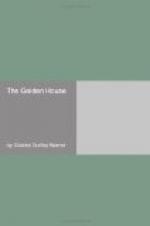And the shame! He could not bear to be observed. It seemed to him that every one would see in his face that he was a recreant priest, perjured and forsworn. And so great had been his spiritual pride! So removed he had deemed himself from the weakness of humanity! And he had yielded at the first temptation, and the commonest of all temptations! Thank God, he had not quite yielded. He had fled. And yet, how would it have been if Ruth Leigh had not had a moment of reserve, of prudent repulsion! He groaned in anguish. The sin was in the intention. It was no merit of his that he had not with a kiss of passion broken his word to his Lord and lost his soul.
It was remorse that was driving him along the avenue; no room for any other thought yet, or feeling. Perhaps it is true in these days that the old-fashioned torture known as remorse is rarely experienced except under the name of detection. But it was a reality with this highly sensitive nature, with this conscience educated to the finest edge of feeling. The world need never know his moment’s weakness; Ruth Leigh he could trust as he would have trusted his own sister to guard his honor—that was all over—never, he was sure, would she even by a look recall the past; but he knew how he had fallen, and the awful measure of his lapse from loyalty to his Master. And how could he ever again stand before erring, sinful men and women and speak about that purity which he had violated? Could repentance, confession, penitence, wipe away this stain?
As he went on, his mind in a whirl of humiliation, self-accusation, and contempt, at length he began to be conscious of physical weariness. Except the biscuit and the glass of wine at the hospital, he had taken nothing since his light luncheon. When he came to the Harlem Bridge he was compelled to rest. Leaning against one of the timbers and half seated, with the softened roar of the city in his ears, the lights gleaming on the heights, the river flowing dark and silent, he began to be conscious of his situation. Yes, he was very tired. It seemed difficult to go on without help of some sort. At length he crossed the bridge. Lights were gleaming from the saloons along the street. He paused in front of one, irresolute. Food he could not taste, but something he must have to carry him on. But no, that would not do; he could not enter that in his priest’s garb. He dragged himself along until he came to a drug-shop, the modern saloon of the respectably virtuous. That he entered, and sat down on a stool by the soda-water counter. The expectant clerk stared at him while waiting the order, his hand tentatively seeking one of the faucets of refreshment.




